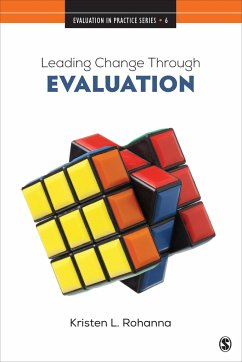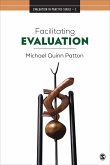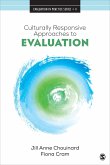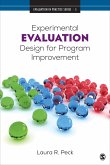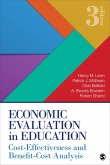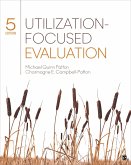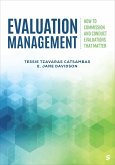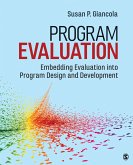- Broschiertes Buch
- Merkliste
- Auf die Merkliste
- Bewerten Bewerten
- Teilen
- Produkt teilen
- Produkterinnerung
- Produkterinnerung
This book shows why those hoping to use evaluation to drive change in complex systems, rather than develop or improve one program, policy, or product, need to shift from the oversimplified idea of formative evaluation to a more specified continuous improvement model grounded in improvement science. In doing so, author Kristen L. Rohanna provides guidance to both evaluators and others, such as K-12 educators or hospital administrators, who lead improvement initiatives in their organizations and seek to solve persistent problems of practice.
Andere Kunden interessierten sich auch für
![Facilitating Evaluation Facilitating Evaluation]() Michael Quinn PattonFacilitating Evaluation42,99 €
Michael Quinn PattonFacilitating Evaluation42,99 €![Culturally Responsive Approaches to Evaluation Culturally Responsive Approaches to Evaluation]() jill ChouinardCulturally Responsive Approaches to Evaluation42,99 €
jill ChouinardCulturally Responsive Approaches to Evaluation42,99 €![Experimental Evaluation Design for Program Improvement Experimental Evaluation Design for Program Improvement]() Laura R. PeckExperimental Evaluation Design for Program Improvement42,99 €
Laura R. PeckExperimental Evaluation Design for Program Improvement42,99 €![Economic Evaluation in Education Economic Evaluation in Education]() Henry M. LevinEconomic Evaluation in Education92,99 €
Henry M. LevinEconomic Evaluation in Education92,99 €![Utilization-Focused Evaluation Utilization-Focused Evaluation]() Michael Quinn Patton (Utilization-Focused Evaluation, Saint Paul, MUtilization-Focused Evaluation124,99 €
Michael Quinn Patton (Utilization-Focused Evaluation, Saint Paul, MUtilization-Focused Evaluation124,99 €![Evaluation Management Evaluation Management]() Anastasia Catsambas (Tessie) TzavarasEvaluation Management92,99 €
Anastasia Catsambas (Tessie) TzavarasEvaluation Management92,99 €![Program Evaluation Program Evaluation]() Susan P. GiancolaProgram Evaluation124,99 €
Susan P. GiancolaProgram Evaluation124,99 €-
-
-
This book shows why those hoping to use evaluation to drive change in complex systems, rather than develop or improve one program, policy, or product, need to shift from the oversimplified idea of formative evaluation to a more specified continuous improvement model grounded in improvement science. In doing so, author Kristen L. Rohanna provides guidance to both evaluators and others, such as K-12 educators or hospital administrators, who lead improvement initiatives in their organizations and seek to solve persistent problems of practice.
Produktdetails
- Produktdetails
- Evaluation in Practice Series
- Verlag: SAGE Publications Inc
- Seitenzahl: 176
- Erscheinungstermin: 2. Februar 2022
- Englisch
- Abmessung: 153mm x 230mm x 12mm
- Gewicht: 248g
- ISBN-13: 9781071847862
- ISBN-10: 1071847864
- Artikelnr.: 62126535
- Evaluation in Practice Series
- Verlag: SAGE Publications Inc
- Seitenzahl: 176
- Erscheinungstermin: 2. Februar 2022
- Englisch
- Abmessung: 153mm x 230mm x 12mm
- Gewicht: 248g
- ISBN-13: 9781071847862
- ISBN-10: 1071847864
- Artikelnr.: 62126535
Kristen Rohanna is a professor in the Educational Leadership Program and Social Research Methodology Division in the School of Education and Information Studies at the University of California, Los Angeles (UCLA). Rohanna's practice and research focus on using evaluative methods to effect social change, with a particular emphasis in the area of education. As such, she works closely with K-12 teachers and administrators to support their use of evaluation and improvement science methods. Before her time at UCLA, Rohanna was a Harvard Strategic Data Fellow and the Manager for Research and Evaluation at the San Jose Unified School District. Her education experience provided the context for her New Direction for Evaluation article: Breaking the Adopt, Attack, Abandon Cycle: A Case for Improvement Science in K-12 Education, about the potential power of continuous improvement methods and the challenges school leaders face when attempting to undertake these methods. Rohanna also has a forthcoming article in the American Journal of Evaluation about building the improvement science capacity of teachers. Rohanna has extensive program evaluation experience, including leading numerous program evaluations for the California Department of Education. Currently, she is leading a statewide evaluation of the 21st Century California School Leadership Academy. The initiative provides professional learning opportunities to K-12 education leaders, including equity-centered leadership and improvement science. Rohanna received her Bachelor of Arts degree in History from the University of Pittsburgh and her Master of Arts degree in Demographic and Social Analysis from the University of California, Irvine. She received her Ph.D. in Social Research Methodology from UCLA.
Series Editor Introduction Acknowledgments Foreword by Louis Gomez Preface About the Author Part 1
Seeking Change in a Complex World Chapter 1
What Do We Mean by Formative Evaluation? The Evolution of Formative Evaluation Continuous Improvement and Improvement Science Other Continuous Improvement Approaches Conclusion Chapter 2
The Truth About Complex Systems Systems and Complexity Science Learning Your Way Through Problems Multiple and Inclusive Perspectives: The Need for Embracing Actors Within the System Building Capacity for Participatory Approaches Conclusion Part 2
The Case Study Introducing the Case Study The Challenge Case Study Conceptual Framework Chapter 3
The Beginnings of a Network Building the Network Hub Team Building the Rest of the Team Recruiting the Network Schools Launching the Network Our Own Challenge: Decision to Separate From the Larger Network Conclusion Chapter 4
The Re-Launch Seeking the Counsel of Others Developing the Network's Theory of Improvement Taking Action Through PDSAs The Network's Outcome, End of Year 1 Conclusion Chapter 5
A Tale of Two Visions - Building Individual Capacity The Math Instructional Vision (Subject Knowledge) The Vision for Building Improvement Science Capacity (Profound Knowledge) The Network's Initial Improvement Science Capacity The Two Visions Intersect Conclusion Chapter 6
The Importance of Being Structured - Building Organizational Capacity Organizational Capacity Individual Versus Organizational Capacity Network Structures Conclusion Chapter 7
Not All Learning Is Created Equal - Fostering Transformational Organizational Learning The Learnings Generated During Year 1 The Importance of Reflective Structures for Single- and Double-Loop Learning Intentionally Designing Activities to Foster Double-Loop Learning Conclusion Chapter 8
Lessons and Reflections From a Case Study Lessons From Research and Practice: Findings From the Case Study Lessons From Continued Practice: Additional Reflections Bringing It All Together: Learning From Astronauts, Elephants, Einstein, and Teachers Moving Forward in a Complex World Appendix: Case Study Methodology Setting Case Study Design References Index
Seeking Change in a Complex World Chapter 1
What Do We Mean by Formative Evaluation? The Evolution of Formative Evaluation Continuous Improvement and Improvement Science Other Continuous Improvement Approaches Conclusion Chapter 2
The Truth About Complex Systems Systems and Complexity Science Learning Your Way Through Problems Multiple and Inclusive Perspectives: The Need for Embracing Actors Within the System Building Capacity for Participatory Approaches Conclusion Part 2
The Case Study Introducing the Case Study The Challenge Case Study Conceptual Framework Chapter 3
The Beginnings of a Network Building the Network Hub Team Building the Rest of the Team Recruiting the Network Schools Launching the Network Our Own Challenge: Decision to Separate From the Larger Network Conclusion Chapter 4
The Re-Launch Seeking the Counsel of Others Developing the Network's Theory of Improvement Taking Action Through PDSAs The Network's Outcome, End of Year 1 Conclusion Chapter 5
A Tale of Two Visions - Building Individual Capacity The Math Instructional Vision (Subject Knowledge) The Vision for Building Improvement Science Capacity (Profound Knowledge) The Network's Initial Improvement Science Capacity The Two Visions Intersect Conclusion Chapter 6
The Importance of Being Structured - Building Organizational Capacity Organizational Capacity Individual Versus Organizational Capacity Network Structures Conclusion Chapter 7
Not All Learning Is Created Equal - Fostering Transformational Organizational Learning The Learnings Generated During Year 1 The Importance of Reflective Structures for Single- and Double-Loop Learning Intentionally Designing Activities to Foster Double-Loop Learning Conclusion Chapter 8
Lessons and Reflections From a Case Study Lessons From Research and Practice: Findings From the Case Study Lessons From Continued Practice: Additional Reflections Bringing It All Together: Learning From Astronauts, Elephants, Einstein, and Teachers Moving Forward in a Complex World Appendix: Case Study Methodology Setting Case Study Design References Index
Series Editor Introduction Acknowledgments Foreword by Louis Gomez Preface About the Author Part 1
Seeking Change in a Complex World Chapter 1
What Do We Mean by Formative Evaluation? The Evolution of Formative Evaluation Continuous Improvement and Improvement Science Other Continuous Improvement Approaches Conclusion Chapter 2
The Truth About Complex Systems Systems and Complexity Science Learning Your Way Through Problems Multiple and Inclusive Perspectives: The Need for Embracing Actors Within the System Building Capacity for Participatory Approaches Conclusion Part 2
The Case Study Introducing the Case Study The Challenge Case Study Conceptual Framework Chapter 3
The Beginnings of a Network Building the Network Hub Team Building the Rest of the Team Recruiting the Network Schools Launching the Network Our Own Challenge: Decision to Separate From the Larger Network Conclusion Chapter 4
The Re-Launch Seeking the Counsel of Others Developing the Network's Theory of Improvement Taking Action Through PDSAs The Network's Outcome, End of Year 1 Conclusion Chapter 5
A Tale of Two Visions - Building Individual Capacity The Math Instructional Vision (Subject Knowledge) The Vision for Building Improvement Science Capacity (Profound Knowledge) The Network's Initial Improvement Science Capacity The Two Visions Intersect Conclusion Chapter 6
The Importance of Being Structured - Building Organizational Capacity Organizational Capacity Individual Versus Organizational Capacity Network Structures Conclusion Chapter 7
Not All Learning Is Created Equal - Fostering Transformational Organizational Learning The Learnings Generated During Year 1 The Importance of Reflective Structures for Single- and Double-Loop Learning Intentionally Designing Activities to Foster Double-Loop Learning Conclusion Chapter 8
Lessons and Reflections From a Case Study Lessons From Research and Practice: Findings From the Case Study Lessons From Continued Practice: Additional Reflections Bringing It All Together: Learning From Astronauts, Elephants, Einstein, and Teachers Moving Forward in a Complex World Appendix: Case Study Methodology Setting Case Study Design References Index
Seeking Change in a Complex World Chapter 1
What Do We Mean by Formative Evaluation? The Evolution of Formative Evaluation Continuous Improvement and Improvement Science Other Continuous Improvement Approaches Conclusion Chapter 2
The Truth About Complex Systems Systems and Complexity Science Learning Your Way Through Problems Multiple and Inclusive Perspectives: The Need for Embracing Actors Within the System Building Capacity for Participatory Approaches Conclusion Part 2
The Case Study Introducing the Case Study The Challenge Case Study Conceptual Framework Chapter 3
The Beginnings of a Network Building the Network Hub Team Building the Rest of the Team Recruiting the Network Schools Launching the Network Our Own Challenge: Decision to Separate From the Larger Network Conclusion Chapter 4
The Re-Launch Seeking the Counsel of Others Developing the Network's Theory of Improvement Taking Action Through PDSAs The Network's Outcome, End of Year 1 Conclusion Chapter 5
A Tale of Two Visions - Building Individual Capacity The Math Instructional Vision (Subject Knowledge) The Vision for Building Improvement Science Capacity (Profound Knowledge) The Network's Initial Improvement Science Capacity The Two Visions Intersect Conclusion Chapter 6
The Importance of Being Structured - Building Organizational Capacity Organizational Capacity Individual Versus Organizational Capacity Network Structures Conclusion Chapter 7
Not All Learning Is Created Equal - Fostering Transformational Organizational Learning The Learnings Generated During Year 1 The Importance of Reflective Structures for Single- and Double-Loop Learning Intentionally Designing Activities to Foster Double-Loop Learning Conclusion Chapter 8
Lessons and Reflections From a Case Study Lessons From Research and Practice: Findings From the Case Study Lessons From Continued Practice: Additional Reflections Bringing It All Together: Learning From Astronauts, Elephants, Einstein, and Teachers Moving Forward in a Complex World Appendix: Case Study Methodology Setting Case Study Design References Index

